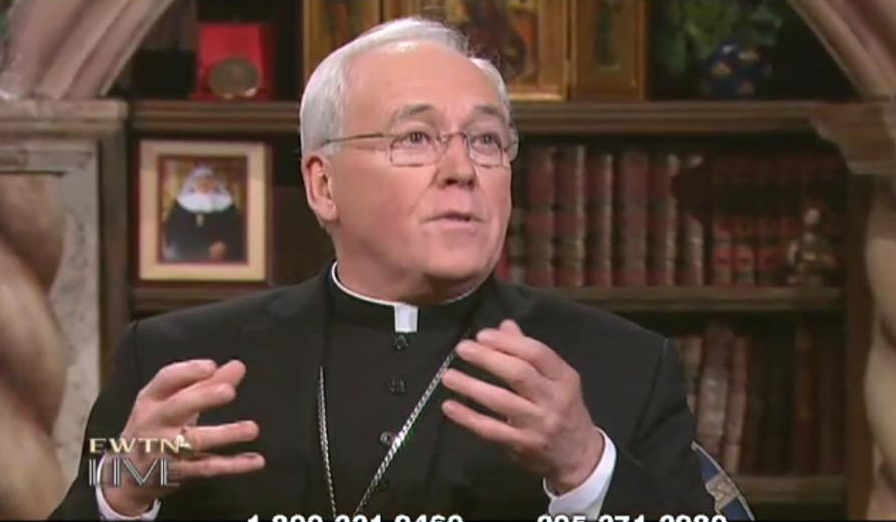Bishop talks religious liberty on EWTN
by MARK CIEMCIOCH
Bishop Richard J. Malone discussed the current status and future of several religious liberty issues on "EWTN Live" Wednesday night. Host Father Mitch Pacwa interviewed the bishop about gay marriage, human trafficking and the HHS mandate forcing religious institutions to provide health care coverage for contraception and abortion-inducing drugs, with Bishop Malone explaining that government intrusion is starting to prevent the Catholic Church from performing its ministries.
The bishop also took questions from audience members and callers. Here are some highlights of the program:
On the Obama administration's enforcement of the HHS mandate and current Supreme Court case in favor of gay marriage:
"Clearly, there is a gradual and very grave erosion of the right to freedom - freedom of religion, freedom of conscience, and freedom of speech too. If you look at some of the thoughts of our founding fathers, even George Washington said in one place that it was really his commitment to civil and religious liberty that drove him to the battlefield."
On how the Supreme Court's upcoming decision on the legalization of gay marriage could impact Catholic institutions like colleges and universities:
"A change in the (marriage) law would not just be one law, it would be a change in employment law, estate law, all these things that have to do with marriage. One thing would be what we call 'compelled association,' whereby if the law were changed to redefine marriage, religious institutions like schools, colleges, hospitals, could be coerced into hiring or retaining people who have entered into so-called same sex marriages. There's the possibility of institutions losing their accreditation or license if they stood up for what our understanding of marriage is, as it came from the creating hands of God."
On the Church's fight against sex trafficking:
"It's slavery. We're no longer able to apply for those contracts for government funding (to fight the crime) because they changed the regulations that would require us to cover contraception and abortion, which we're not going to do. That also is what has caused some Catholic Charities agencies - my home, Boston, is one - to stop doing adoptions and foster care because of the requirement to let same-sex couples adopt children, which we don't believe is a good thing for their upbringing. It's just on so many levels of our lives.
"This is why it's such a grave, grave threat for the work of the Church, to the mission that Christ has given us to carry out in the world and in this country, because we are not going to give in to this requirement. It's really a coercion from the government to get involved in things that are gravely immoral, and so that weakens our ability to reach out and do the beautiful work that Christ has called us to do."
On how Roe v. Wade and the gay marriage issue are related:
"Anybody who's gone to the March for Life can't help be moved - and I go every year - by the increasing number of youths and young adults who are there. It's nice to see a whole new cohort of people who are convinced of this. And I'm convinced, too, and I hate to say this, if the Supreme Court does in a couple of weeks does what we think they probably will do, and we should pray they won't, and gives in to this redefinition of marriage into something other than what God created it to be, I want to hope, pray and work that the effort to question and turn around Roe v. Wade, I'm sure, will develop around marriage. There will continue to be a reaction to it."
On what Catholics should do to advocate for its mission:
"Catholics need to get ourselves more informed about this issues. We have to understand what is at stake. Get informed about what will be the probable consequences that you can predict right now and decide you are not going to be silent. Write to your Congress people. Write to the newspaper. Call the talk shows. It's calling us to pay closer attention to what's going on in the culture, and bring to it the light of the Gospel."
On answering a question about getting clergy speaking more publicly about these issues:
"She's right. I don't want to indict all my brother clergy either, but sometimes we who preach can avoid what we call the difficult issues. That is not responsible for a preacher. The people need to hear more from us the Catholic teaching as it applies to these issues. A good preacher, I believe, always connects the dots between God's revelation in scripture and the teachings of the time."
For more information, visit http://religiousliberties.org.




